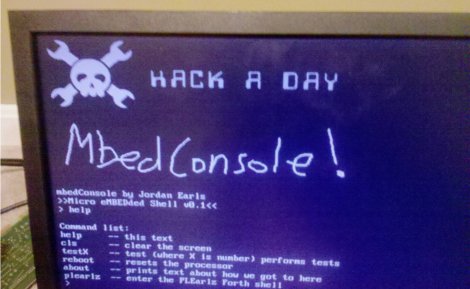
[Jordan] writes in to show us a project he has been working on called MbedConsole. Living up its name [Jordan] has managed to run a 640×480 VGA output, PS/2 port and console all from the mbed itself. We really mean from an mbed only; no extra hardware is required aside from a few resistors and connectors, a VGA monitor and PS/2 keyboard. The code is open source and links are included in the blog. There are even instructions for including your own graphics.
There are a few things to tackle still, like SD card support. Currently the PS/2 keyboard lights for caps-lock are not functional. [Jordan] would love to know what else we’d see going on something like this, with 400k of flash and 20k RAM left there certainly is a bit of room for some interesting stuff. One of his main goals is to get rid of the C interface and port an interactive shell over that could do something like BASIC or Forth (to give it that retro environment feel). We have seen the mbed in a handful of projects, what do you think?















They really start young these days, this Jordan fellow looks like a little girl.
I’d reckon he’s no more than 3 years old!
Har har. That’s actually my step daughter. She’s my “beta tester” for my keyboard driver lol
So… a proper competitor the Parallax Propeller, finally? Nice.
I wouldn’t say it’s a direct competitor. The propeller is completely different. However, you now can use something else for generating VGA signals(including nothing, if using an mbed :) )
VGA is easy, pretty much any MCU can generate it; though not all equal resolution and color depth, or with a useful amount of processing power left. Color composite video is actually much harder, and the Propeller seems unique in its ability to generate it easily.
[Jordan], if you’ve looked yet and come across any candidates for full-screen editors or BASIC, I’d be interested to hear what you’ve found.
I’ve looked, but not found anything I can directly port to mbed with ease. That’s why in my blog post I ask if anyone would like to contribute in that area :)
A BASIC would be really nice, but Forth would be easier to implement… Really, it should be possible to have both. I have enough Flash for it after all.
NuttX could be a good operating system for this kind of a device. It already includes SD-card support, runtime mountable filesystems, command shell and even a graphical subsystem.
“Currently the PS/2 keyboard lights and caps-lock are not functional.”
So the keyboard code is complete and bugfree then. Excellent.
Who wrote the article got that portion wrong. Caplock and such works(including shift), but the LEDs on the keyboard don’t come on when capslock is on. It shouldn’t be too hard to make the LEDs work, but it’s pretty low priority right now
Man, the mBed looks really cool until you look at the price! — $60 — seems like you should just be able to buy a palette used terminals for that cost!
Anyway, the propeller is what $8? And we’ve seen people do this same project with AVRs… (with an Oscilloscope for the screen no less!) can’t remember which chip it was, but AVR on the low end is like $1.50? And the high-end is like $8-12…(?)
I’ll just stick to AVR for now.
Here you go: http://hackaday.com/2010/02/24/oscilloscope-doubles-as-a-serial-terminal/
Might I suggest adding some tags to this, like “VGA” (or something equivalent — wherever you put software generated VGA/video hacks) and “Terminal” or something equivalent. :-)
I completely agree the mbed is overpriced. I believe a portion of this is for access to the online compiler. I bought one before this sudden explosion of inexpensive ARM dev boards that could be programmed by USB(ie, without a $50 programmer). I think it was also before the propeller came out, or at least before it became hugely popular.
I think the mbed’s main selling point is how everything kind of just works. The online compiler makes everything super consistent and it really is a nice environment to get your feet wet with ARM. It also has a lot of nice peripherals that are a library include away from using.
One of my inspirations for this project, along with doing retro-like computing, is an easy way to test my FPGA programs in hardware without having to reprogram my mbed for each test